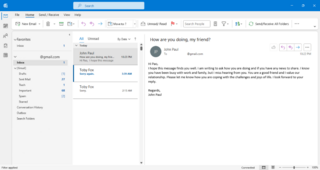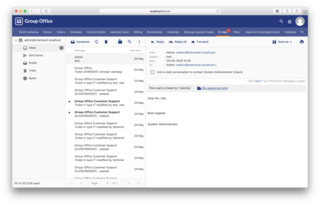
GNOME Evolution is the official personal information manager for GNOME. It has been an official part of GNOME since Evolution 2.0 was included with the GNOME 2.8 release in September 2004. It combines e-mail, address book, calendar, task list and note-taking features. Its user interface and functionality is similar to Microsoft Outlook. Evolution is free software licensed under the terms of the GNU Lesser General Public License (LGPL).

Microsoft Outlook is a personal information manager software system from Microsoft, available as a part of the Microsoft 365 software suites. Though primarily being popular as an email client for businesses, Outlook also includes functions such as calendaring, task managing, contact managing, note-taking, journal logging, web browsing, and RSS news aggregation.
Messaging Application Programming Interface (MAPI) is an API for Microsoft Windows which allows programs to become email-aware. While MAPI is designed to be independent of the protocol, it is usually used to communicate with Microsoft Exchange Server.

SOGo is an open source collaborative software (groupware) server with a focus on simplicity and scalability.
Open-Xchange is an open source web-based office productivity software suite.
The Cyrus IMAP server is electronic mail server software developed by Carnegie Mellon University. It differs from other Internet Message Access Protocol (IMAP) server implementations in that it is generally intended to be run on sealed servers, where normal users cannot log in.

Scientific Linux (SL) is a discontinued Linux distribution produced by Fermilab, CERN, DESY and by ETH Zurich. It is a free and open-source operating system based on Red Hat Enterprise Linux.
Kolab is a free and open source groupware suite. It consists of the Kolab server and a wide variety of Kolab clients, including KDE PIM-Suite Kontact, Roundcube web frontend, Mozilla Thunderbird and Mozilla Lightning with SyncKolab extension and Microsoft Outlook with proprietary Kolab-Connector PlugIns.

Scalix is an e-mail and groupware server that runs on Linux, licensed under the Scalix Public License (SPL).

Zimbra Collaboration, formerly known as the Zimbra Collaboration Suite (ZCS) before 2019, is a collaborative software suite that includes an email server and a web client.

Group-Office is a PHP based dual license commercial/open source groupware and CRM and DMS product developed by the Dutch company Intermesh. The open source version, Group-Office Community, is licensed under the AGPL, and is available via GitHub. GroupOffice Professional is a commercial product and offers additional business modules like project management, finance, HR and time tracking.
Bynari is a defunct company based in Dallas, developing server and email software, mainly known for its Insight Family, similar to Microsoft Exchange Server with Outlook.

EGroupware is free open-source groupware software intended for businesses from small to enterprises. Its primary functions allow users to manage contacts, appointments, projects and to-do lists. The project releases its software under the terms of GNU General Public License (GPL).

Zarafa was an open-source groupware application that originated in the city of Delft in the Netherlands. The company that developed Zarafa, previously known as Connectux, is also called Zarafa. The Zarafa groupware provided email storage on the server side and offered its own Ajax-based mail client called WebAccess and a HTML5-based, WebApp. Advanced features were available in commercially supported versions. Zarafa has been superseded by Kopano.

ClearOS is a Linux distribution by ClearFoundation, with network gateway, file, print, mail, and messaging services.

Criticism of desktop Linux is a history of comment on the perceived shortcomings of the Linux operating system when installed on desktop computers. These criticisms have been aimed at the plethora of issues and lack of consistency between Linux distributions, their usefulness and ease of use as desktop systems for general end users, driver support and issues with multi-media playback and audio development.
Kopano is an open-source groupware application suite originally based on Zarafa. The initial version of Kopano Core (KC) was forked from the then-current release of Zarafa Collaboration Platform, and superseded ZCP in terms of lineage as ZCP switched to maintenance mode with patches flowing from KC. Kopano WebApp similarly descended from Zarafa WebApp. Since October 2017, Kopano Core is also known more specifically as Kopano Groupware Core, since Kopano B.V. developed more products that were not directly requiring groupware components.
MDaemon Email Server is an email server application with groupware functions for Microsoft Windows, first released by Alt-N Technologies in 1996.
The JSON Meta Application Protocol (JMAP) is a set of related open Internet Standard protocols for handling email. JMAP is implemented using JSON APIs over HTTP and has been developed as an alternative to IMAP/SMTP and proprietary email APIs such as Google's Gmail and Microsoft's MAPI . Additional protocols and data models being built on top of the core of JMAP for handling contacts and calendar synchronization are meant to be potential replacements for CardDAV and CalDAV, and other support is currently in the works.












